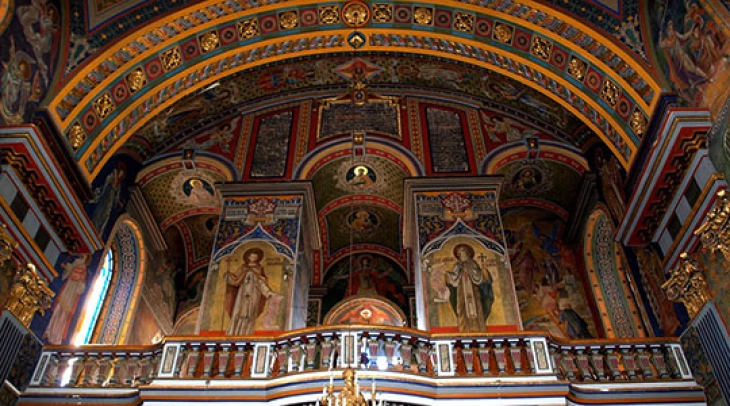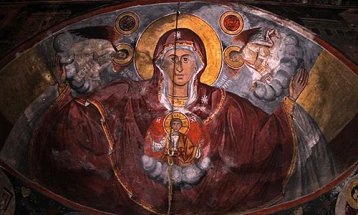Religious calendars
- fter her Dormition [Falling-asleep], the Holy Theotokos gave her girdle [sash] to the Apostle Thomas.

13 September 2024 (MIA)
Macedonian Orthodox Church Calendar
The Feast of the Girdle of the Holy Birth-Giver of God
After her Dormition [Falling-asleep], the Holy Theotokos gave her girdle [sash] to the Apostle Thomas. That girdle was later brought to Constantinople and kept in a sealed reliquary in the church of the Mother of God at Blachernae, the royal foundation of Empress Pulcheria. This reliquary was never opened until the time of Emperor Leo the Wise (886-912 AD). Leo’s wife, the Empress Zoe, became mentally ill and, according to a mysterious vision, she desired that the girdle of the Holy Theotokos be placed on her. The emperor implored the patriarch and the reliquary was opened and the girdle was removed and placed on the ailing empress. The empress was immediately healed. This feast was instituted in commemoration of this miracle. One part of the girdle is to be found in Zugdid, Georgia. That is to say: the daughter of Emperor Romanus was healed with the aid of this girdle and later when her father married her to the Georgian Emperor Abuchaz, she took a part of that girdle with her. By order of the Russian Emperor Alexander I, a special church was built in Mingrelia in Zugdid where that part of the miracle-working garment of the Holy Theotokos is kept.
Catholic Calendar
St. John Chrysostom
St. John, named Chrysostom (golden-mouthed) on account of his eloquence, came into the world of Christian parents, about the year 344, in the city of Antioch. His mother, at the age of 20, was a model of virtue. He studied rhetoric under Libanius, a pagan, the most famous orator of the age. In 374, he began to lead the life of an anchorite in the mountains near Antioch, but in 386 the poor state of his health forced him to return to Antioch, where he was ordained a priest. In 398, he was elevated to the See of Constantinople and became one of the greatest lights of the Church. But he had enemies in high places and some were ecclesiastics, not the least being Theophilus, Patriarch of Alexandria, who repented of this before he died. His most powerful enemy, however, was the empress Eudoxia, who was offended by the apostolic freedom of his discourses. Several accusations were brought against him in a pseudo-council, and he was sent into exile. In the midst of his sufferings, like the apostle, St. Paul, whom he so greatly admired, he found the greatest peace and happiness. He had the consolation of knowing that the Pope remained his friend, and did for him what lay in his power. His enemies were not satisfied with the sufferings he had already endured, and they banished him still further, to Pythius, at the very extremity of the Empire. He died on his way there on September 14, 407.







